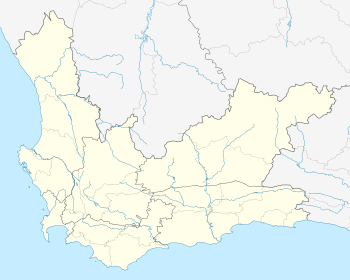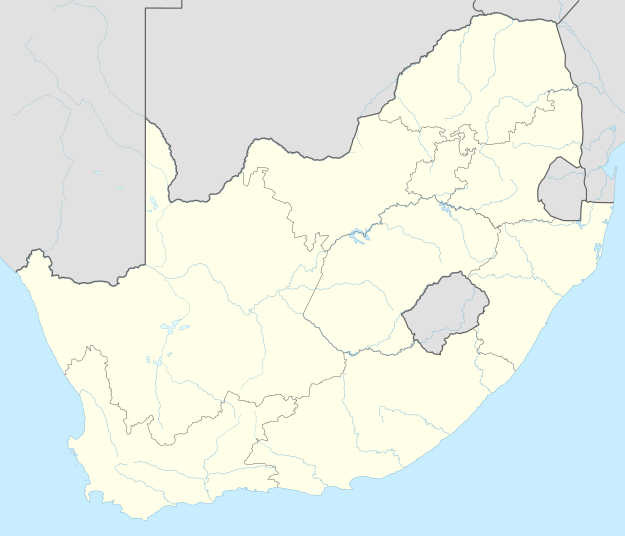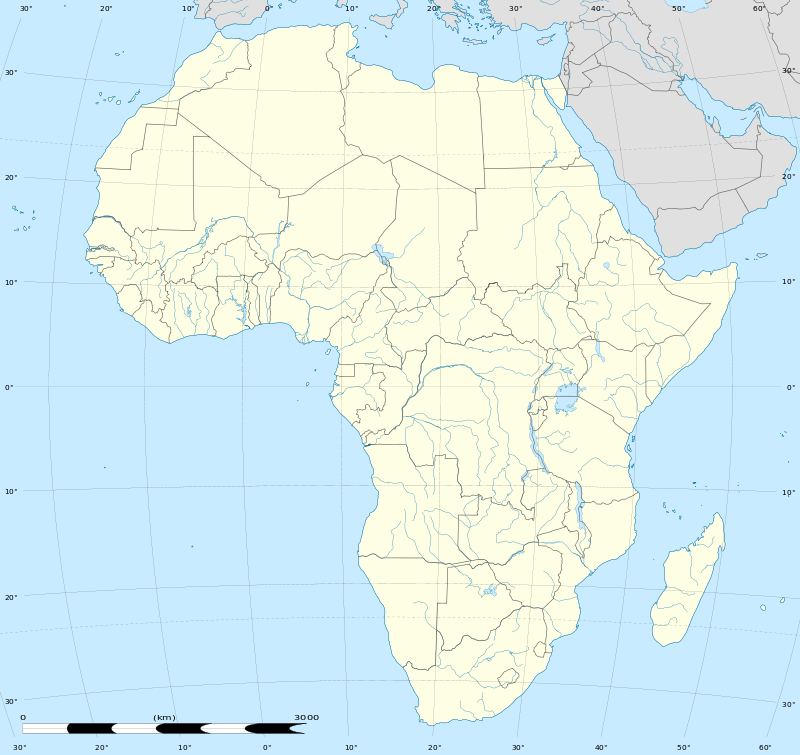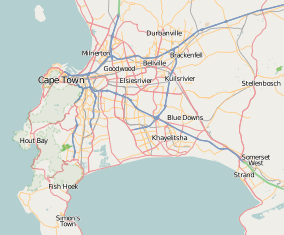Langa, Cape Town
| Langa | |
|---|---|
|
Langa Township | |
 Langa  Langa  Langa
| |
|
Location within Cape Town  Langa | |
| Coordinates: 33°56′43″S 18°31′48″E / 33.94528°S 18.53000°ECoordinates: 33°56′43″S 18°31′48″E / 33.94528°S 18.53000°E | |
| Country | South Africa |
| Province | Western Cape |
| Municipality | City of Cape Town |
| Established | 1927 |
| Government | |
| • Councillor |
Mayenzeke Sopaqa (Ward 51) (ANC) Neliswa Nqose (Ward 52) (Independent) Brian Watkyns (Ward 53) (DA) |
| Area[1] | |
| • Total | 3.09 km2 (1.19 sq mi) |
| Population (2011)[1] | |
| • Total | 52,401 |
| • Density | 17,000/km2 (44,000/sq mi) |
| Racial makeup (2011)[1] | |
| • Black African | 99.1% |
| • Coloured | 0.4% |
| • Indian/Asian | 0.1% |
| • White | 0.1% |
| • Other | 0.4% |
| First languages (2011)[1] | |
| • Xhosa | 92.0% |
| • English | 2.5% |
| • Other | 5.5% |
| Postal code (street) | 7455 |
| PO box | 7456 |
Langa is a township and suburb of Cape Town, South Africa. It was established in 1927 in terms of the 1923 Urban Areas Act. Similar to Nyanga, Langa is one of the many areas in South Africa that were designated for Black Africans before the apartheid era. It is the oldest of such suburbs in Cape Town and was the location of much resistance to apartheid. Langa is also where several people were killed on 21 March 1960 same day as the Sharpeville massacre, during the anti-pass campaign. On 21 March 2010, now 50 years later, a monument was unveiled by the government in remembrance of the people who lost their lives.
Location
Langa is bordered by Jan Smuts Drive to the west, the N2 to the south, the N7 to the east and is served by Langa Railway Station.
History
Although Langa literally means "sun" in Xhosa, the name of the township is derived from the name of Langalibalele - a chief and renowned rainmaker who in 1873 was imprisoned on Robben Island for rebelling against the Natal government.[2] Various prominent people fought for his release and he was subsequently confined to a farm called "Uitvlugt", which is on the site of present-day Pinelands. Langa, which adjoins Pinelands, commemorates this folk hero as it was developed in 1898 on the land known as "Langalibalele's Location". Hence Langa is often called "Kwa-Langa" meaning "place of Langa".
Langa was originally designed in a way to allow the authorities maximum visibility and control of residents. In the early years local laws prohibiting the brewing of sorghum beer (utywala) was strongly resented and in the 1930s prohibition was abolished in the area with the construction of municipal beer halls taking place in 1945. In these early years tribal and sub-tribal ethnic identities were still very strong. Often local celebrations by the Mfengu community celebrating their "liberation" from the Xhosa would lead to an increase in tensions. However, the close living conditions of residents in Langa promoted a high degree of neighbourliness and the creation of broader African institutions that promoted a greater sense of community cohesion.[2]
On the 30 March 1960 Langa was the starting point for a march of 30,000 - 50,000 protesters to Nyanga police station led by Pan Africanist Congress to protest the hated Apartheid era pass laws.[3]
Recent history
Joe Slovo which was established in 1990 is the largest informal settlement in Langa and one of the largest in the country. It is currently being threatened with forced removal to make way for the N2 Gateway Housing Project. Some parts of the Joe Slovo informal settlement has since been removed, and transformed into the N2 Gateway Housing Project (2006), as seen when travelling along the Settler's Way N2 Highway out of Cape Town.
In 2005 Gugas'Thebe, a cultural/ multi-purpose centre was officially opened in Langa after being in operation for a number of years (unofficially). The first Township B&B by the name of Ma Neo (mother of Neo) was opened in 1999.
On 9 July 2014 Langa was the sight of violent protests to protest government service delivery specifically of housing but soon turned into a more general protest about broader issues such as Marikana massacre and general living conditions. A number of shops and local businesses were torched and looted and transport links to the rest of the city were closed off by protesters.[4]
Notable residents
Langa has over the years produced some prominent figures in sport, entertainment and other social fields. These famous people in recent times include the late musician Brenda Fassie, international acclaimed marimba group Amampondo, former Bafana Bafana and Orlando Pirates captain Thabo Mngomeni, boxer Nika Khumalo, South African wicket-keeper Thami Tsolekile and many others. Even decades ago some well known public figures emerged from Langa.
- Thabo Mngomeni, South African soccer player.
- Thami Tsolekile, South African cricketer.
- Temba Bavuma, South African cricketer.
- Fatima Dike, South African playwright and theatre director
- Nobuntu Theodora Nomalungelo Nkanyuza, Founder Director of Eyabantu Creche-1986 & ikhaya Labantu Homeless Shelter-1987
External links
- History of Langa township at capetown.at
- Ma Neo Township Stay
- Langas-murder-rate-contributed-to-55-percent-of-murders-in-CT
References
- 1 2 3 4 "Main Place Langa". Census 2011.
- 1 2 "Langa Township". Roddy Bray. Retrieved 10 July 2014.
- ↑ "The Langa March, 30 March 1960". South African History Online. Retrieved 10 July 2014.
- ↑ "Langa shuts down amid violet protests". Cape Argus. Retrieved 10 July 2014.

.svg.png)